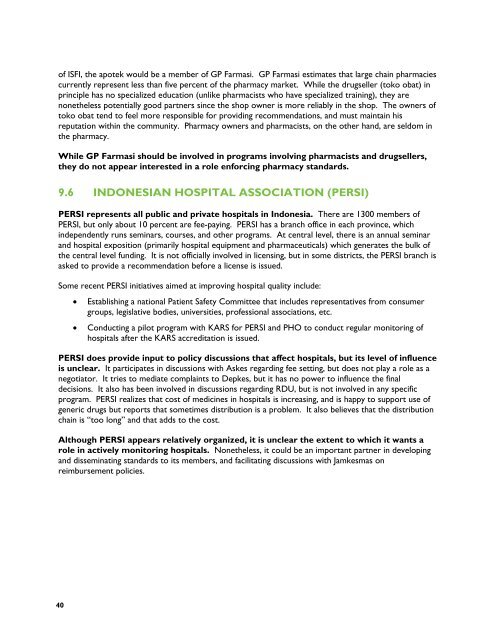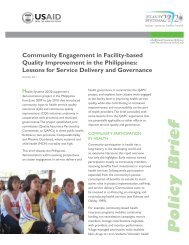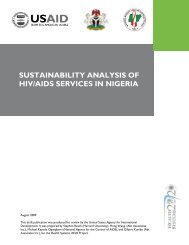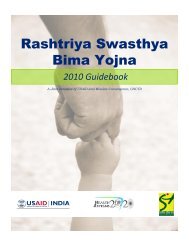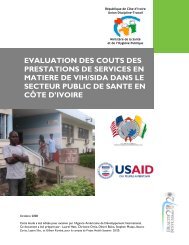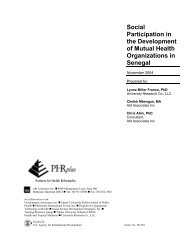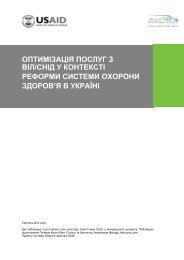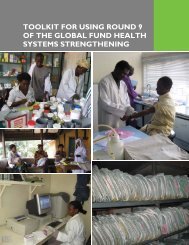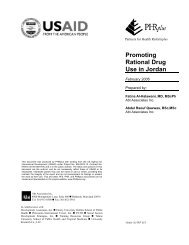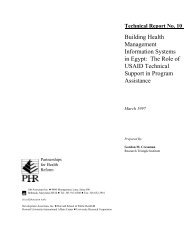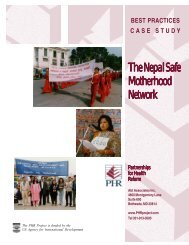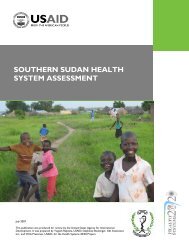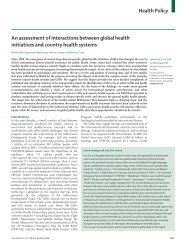of ISFI, the apotek would be a member of GP Farmasi. GP Farmasi estimates that large chain pharmaciescurrently represent less than five percent of the pharmacy market. While the drugseller (toko obat) inprinciple has no specialized education (unlike pharmacists who have specialized training), they arenonetheless potentially good partners since the shop owner is more reliably in the shop. The owners oftoko obat tend to feel more responsible for providing recommendations, and must maintain hisreputation within the community. Pharmacy owners and pharmacists, on the other hand, are seldom inthe pharmacy.While GP Farmasi should be involved in programs involving pharmacists and drugsellers,they do not appear interested in a role enforcing pharmacy standards.9.6 <strong>IN</strong>DONESIAN HOSPITAL ASSOCIATION (PERSI)PERSI represents all public and private hospitals in Indonesia. There are 1300 members ofPERSI, but only about 10 percent are fee-paying. PERSI has a branch office in each province, whichindependently runs seminars, courses, and other programs. At central level, there is an annual seminarand hospital exposition (primarily hospital equipment and pharmaceuticals) which generates the bulk ofthe central level funding. It is not officially involved in licensing, but in some districts, the PERSI branch isasked to provide a recommendation before a license is issued.Some recent PERSI initiatives aimed at improving hospital quality include:• Establishing a national Patient Safety Committee that includes representatives from consumergroups, legislative bodies, universities, professional associations, etc.• Conducting a pilot program with KARS for PERSI and PHO to conduct regular monitoring ofhospitals after the KARS accreditation is issued.PERSI does provide input to policy discussions that affect hospitals, but its level of influenceis unclear. It participates in discussions with Askes regarding fee setting, but does not play a role as anegotiator. It tries to mediate complaints to Depkes, but it has no power to influence the finaldecisions. It also has been involved in discussions regarding RDU, but is not involved in any specificprogram. PERSI realizes that cost of medicines in hospitals is increasing, and is happy to support use ofgeneric drugs but reports that sometimes distribution is a problem. It also believes that the distributionchain is “too long” and that adds to the cost.Although PERSI appears relatively organized, it is unclear the extent to which it wants arole in actively monitoring hospitals. Nonetheless, it could be an important partner in developingand disseminating standards to its members, and facilitating discussions with Jamkesmas onreimbursement policies.40
10. CONCLUSIONS ANDRECOMMENDATIONSIn the current environment, there is significant scope to work with private providers toimprove access to health services and quality of health services. Private providers are varied,and provide critical public health services. There is potential to develop programs with different cadresof providers and provider networks, including new groups that have not traditionally been developmentpartners. While concurrently engaging central-level stakeholders in policy dialogue, interventionstargeted toward district and province level would have the greatest potential for more immediateimpact. Further, the type of engagement proposed does not involve drastic changes in policy direction,rather small adjustments to implementation procedures can significantly improve potential healthoutcomes.There have been several important changes in the health financing scenario over the lastfive years. Public funding for health has increased substantially, primarily from central budget, but alsofrom district budgets. Jamkesmas, the government financing scheme for the poor represents 25 percentof Depkes’ budget. At least 60 districts, and as many as 100, have supplemental financing schemes forthe poor or near-poor. Nearly all NGO hospitals accept Jamkesmas, and in some areas, individualproviders (such as private midwives) also accept Jamkesmas. Less than 25 percent of Jamkesmas funding(Rp 1.0 trillion of Rp 4.6 trillion) is allocated to Puskesmas, which means the large majority of Jamkesmasfunding can be used at public and private providers. The civil servants health insurance scheme, althoughnot new, is funded at approximately Rp 3.0 trillion per year, and contracts with public and privateproviders. Significant public funding is being used to pay private providers using payment policies that donot necessarily promote public health priorities or high quality care. For example, there is little controlover drug use at hospital level, which represents a significant portion of total costs.While Jamkesmas and other district-level financing schemes are referred to as insuranceschemes, they bear little resemblance to true insurance policies. The premiums are not set tomatch the benefits package, there are no measures to manage demand, and no measures to managetreatment standards. Insurance payers have advantages over individuals in ensuring quality and enforcingadherence to clinical standards – they have greater access to technical skills and more leverage overproviders as they represent thousands of patients.By using their power to select which providers to contract with, and enforcing treatmentprotocols with their payment policies, Jamkesmas and other financing mechanisms havepotential to provide incentives for providers to improve care and adhere to qualitystandards. Simple changes include paying providers who refer patients when necessary, or not payingfor branded drugs when generic is available. Payment policies can also be used to target interventionsthat promote public health (such as providing higher reimbursement for the fourth ANC visit, orcompletion of DOTS treatment). Making small changes to Jamkesmas reimbursement policies couldsignificantly improve the quality of care, and improve health outcomes.There is little coordination between district health officials and central public healthprograms, or between the district health officials and private providers. While district healthoffices have greater authority over health services within their districts, they do not always have the41
- Page 1:
PRIVATE SECTOR HEALTHCARE IN INDONE
- Page 5:
PRIVATE SECTOR HEALTH CAREIN INDONE
- Page 8 and 9:
7. Rationalizing Use of Medications
- Page 11 and 12: ABBREVIATIONSANCAskesAskeskinAusAID
- Page 13: THEUSAIDVATWHOTotal health expendit
- Page 17 and 18: EXECUTIVE SUMMARYAs documented in I
- Page 19 and 20: By using their power to select whic
- Page 21: higher reimbursement for complex de
- Page 25 and 26: 2. BACKGROUND2.1 GENERAL BACKGROUND
- Page 27 and 28: While decentralization of the healt
- Page 29: FIGURE 1: TOTAL EXPENDITURES ON HEA
- Page 32 and 33: poor, which only allows use of publ
- Page 34 and 35: Lack of overall investment in healt
- Page 36 and 37: • Pharmacists and drugsellers - A
- Page 38 and 39: 4.2 ASSESSMENT APPROACHData collect
- Page 40 and 41: practice, however, limited resource
- Page 42 and 43: Dinas to the hospital detailing the
- Page 44 and 45: Unlike Muhammadiyah and NU faciliti
- Page 46 and 47: TABLE 3: POPULATION COVERAGE BY HEA
- Page 48 and 49: customary fees. At the same time, i
- Page 51 and 52: 7. RATIONALIZING USE OFMEDICATIONS7
- Page 53 and 54: too few medicines to meet the publi
- Page 55 and 56: 8. PHARMACISTS ANDDRUGSELLERS AS PA
- Page 57 and 58: district provides TB drugs to priva
- Page 59 and 60: 9. ROLE OF PROFESSIONALASSOCIATIONS
- Page 61: IMA is involved in any allegations
- Page 65: If Indonesia is to achieve its prio
- Page 68 and 69: • Supporting the mapping of all f
- Page 71 and 72: ANNEX A: ASSESSMENT GUIDEIndonesia
- Page 73 and 74: Key Informants at Provincial LevelK
- Page 75: Key InformantsoooIBI, and memberrep
- Page 78 and 79: Assessment Question Approach/Backgr
- Page 80 and 81: Indicator Number Data Source and No
- Page 82 and 83: 1.3.4 DinKes Experience with Privat
- Page 84 and 85: The team interviewed a manager 16 a
- Page 86 and 87: They have used many different healt
- Page 88 and 89: In Yogyakarta Province, there are 1
- Page 90 and 91: graduates to work immediately in 24
- Page 92 and 93: Muhammadiyah is a 226 bed hospital
- Page 94 and 95: Dinas Yogyakarta31. Mardiningsih, S
- Page 96 and 97: 2.1 Provincial InformationThe popul
- Page 98 and 99: How can services provided at privat
- Page 100 and 101: The Provincial Health Office meets
- Page 102 and 103: from multiple sources: 40 percent f
- Page 104 and 105: 2.9 Licensing and Oversight of Phar
- Page 106 and 107: As per IMA Propinsi, they meet with
- Page 108 and 109: It was mentioned that the budget fo
- Page 110 and 111: • Private midwives are willing to
- Page 112 and 113:
etween PKBI and the District Health
- Page 114 and 115:
Cahya Kawaluyan Hospital has adapte
- Page 116 and 117:
the midwife to charge a slightly hi
- Page 118 and 119:
Involving Physicians in DOTS. A sig
- Page 120 and 121:
Ikatan Bidan Indonesia (IBI) West J
- Page 122 and 123:
Indicator DKI West Jakarta Data Sou
- Page 124 and 125:
visited an average of over 60 perce
- Page 126 and 127:
3.9 Potential role of professional
- Page 128 and 129:
members who pay membership fees. Th
- Page 130 and 131:
emainder paying out of pocket. Reve
- Page 132 and 133:
3.20 Indonesian Pharmacists Associa
- Page 134 and 135:
OtherApotek Gitamara, Jl. Kemanggis
- Page 136 and 137:
13. Government of Indonesia, World
- Page 138:
41. Thrabany, Hasbullah, et al. 200


